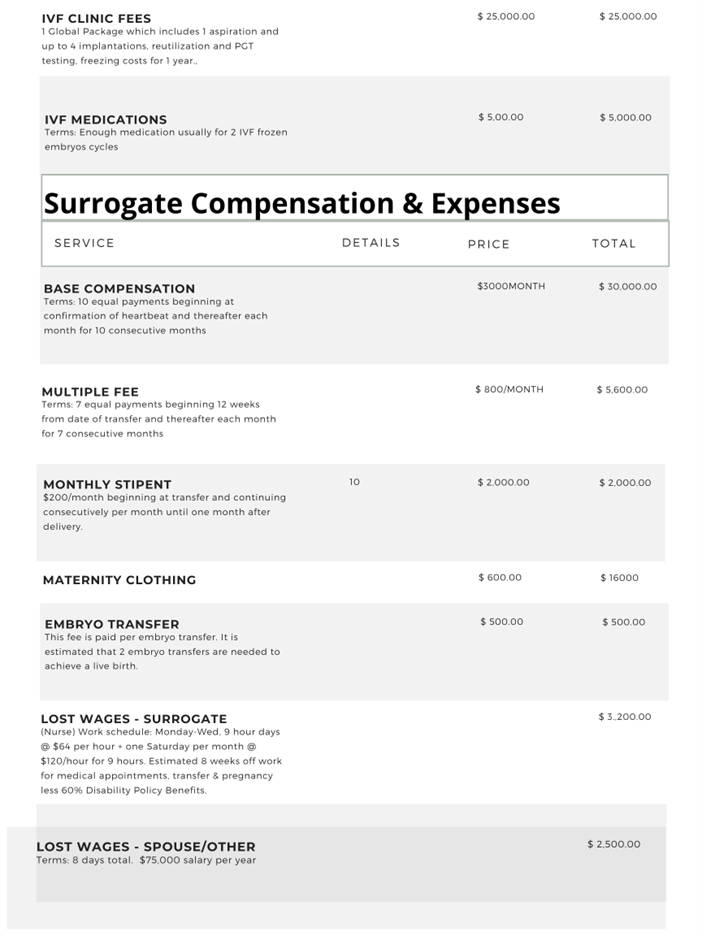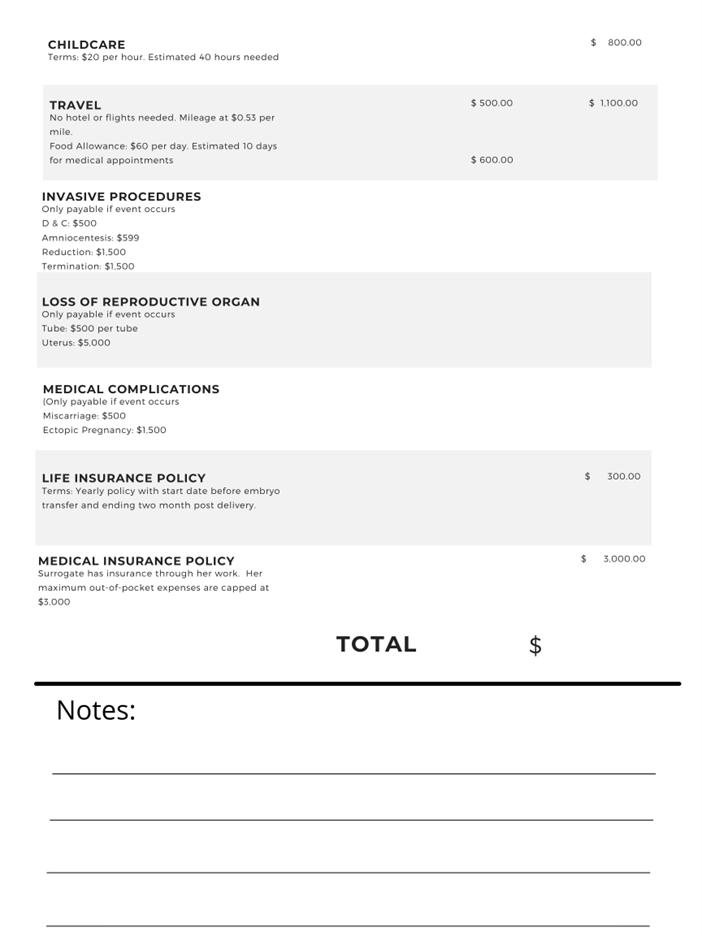A surrogacy agreement, also known as a gestational carrier agreement, is a legally binding document that outlines the rights, responsibilities, and expectations of all parties involved in a surrogacy arrangement. While specific requirements may vary depending on the jurisdiction and individual circumstances, here are some common elements typically included in a surrogacy contract:
Identification of Parties
The contract should clearly identify the intended parents (or the individual or couple commissioning the surrogacy) and the surrogate (or gestational carrier) involved in the arrangement. This means identifying the parties by their full legal names as they appear on their passports or driver’s license. It is highly recommended that each attorney keeps proof of identity for all the parties.
In addition, the identity of the attorneys representing each party, the identity of the mental health professional who screened the surrogate, and the identity of the IVF clinic should be noted.
Terms and Conditions
The contract should outline the agreed-upon terms and conditions, including the duration of the agreement, the number of embryo transfer attempts allowed, and any specific medical procedures or protocols. Here is an example of terms and conditions to be included:
- All Parties are over the age of 21 years.
- A statement that the embryo(s) are genetically related to both intended parents or a description of the genetic makeup of the embryos.
- The surrogate and her partner agree not to permit themselves to be exposed to tobacco products, marijuana products, or any illegal substances or drugs and not to use any medications or supplements without prior written consent from her treating physician.
- The surrogate agrees not to travel by air or journey outside the agreed birth area jurisdiction without obtaining her treating physician’s approval. Intended parents must also be notified of these travel plans.
- The surrogate agrees that she will continue to reside in the state/province/territory she presently resides in until birth.
- The surrogate must keep the approved insurance policy active throughout the pregnancy and for a minimum of six months postpartum. If the policy is procured explicitly for this pregnancy, the intended parents will be responsible for covering its costs.
- Intended parents shall ensure the child will have medical insurance coverage from birth.
- A statement that all Parties know there are medical, psychological, financial, and legal risks involved in surrogacy, and each Party holds the other non-liable for these risks.
- All Parties shall inform each other and any medical professional of any material change in their circumstances that may reasonably affect the terms of this agreement.
- Any party may terminate this agreement in writing at any time before an embryo transfer that results in a pregnancy.
- This agreement shall terminate six months from birth unless the surrogate needs ongoing medical attention.
- The intended parents are required to purchase a life insurance policy for the surrogate before any invasive medical procedure takes place, designating the surrogate’s family as the beneficiaries. In the unfortunate event of the surrogate’s death, any liability owed by the intended parents to the surrogate or her heirs is capped at the value of the life insurance policy.
Compensation and Expenses
The contract should specify the financial aspects of the arrangement, including the compensation to be provided to the surrogate for her services and the reimbursement of related expenses, such as medical, travel, and legal fees. The following should be included:
- Intended parents shall fund an escrow account in the amount agreed to by the parties before any medication or medical procedure begins.
- Details should be included regarding what reimbursements are contemplated under this agreement. For example – payments for her living expenses, expenses incurred in pursuit of the terms of this surrogacy agreement, psychological expenses, and compensation for her pain, suffering, discomfort, and emotional distress due to her participation in this arrangement.
- If an expenses schedule or estimated cost sheet outlines the expenses, compensation, and amounts, this should be attached to the surrogacy agreement as an exhibit. An example of an estimated cost sheet has been attached at the end of this document.
- Details should be provided on the schedule of payments and/or calendar dates of various payments.
- The intended parents shall pay the surrogate’s attorney fees for this surrogacy arrangement. However, the intended parents are not liable for attorney fees incurred in a dispute or challenge of the terms of this agreement.
Medical Procedures and Prenatal Care
The contract should address the medical procedures involved in the surrogacy journey, including the expectations for prenatal care, medical screenings, and the surrogate’s responsibilities in maintaining her health during the pregnancy. Some examples are:
- Parties agree to undergo social disease testing and share the results with each other.
- The surrogate agrees to undergo IVF treatment and have at least one embryo transferred to her uterus.
- All Parties agree to follow the medical advice of the treating physician.
- The surrogate agrees to be seen by a board-certified obstetrician throughout the pregnancy, covered by her medical insurance policy.
- The surrogate will inform the intended parents in the event of a complication or emergency during the pregnancy in which the health of the surrogate or fetus is at risk or likely to be at risk.
- State the location of where the surrogate birth is to occur.
- The intended parents have the option to be present at doctor appointments either physically or virtually, provided that they receive approval from the attending physician.
- The surrogate agrees to participate in genetic testing of the child/children she carries at the request of the intended parents, either during the pregnancy or at the birth.
- The surrogate agrees to notify the intended parents when labor first begins.
- Surrogate to sign an agreement before the birth, permitting the intended parents to attend the delivery to the extent permitted by the hospital or birthing center.
- Reimbursements and compensation will cease once the surrogate is released to everyday activity by her physician.
Legal Rights and Parental Establishment
The contract should address the intended parents’ legal rights and the process for establishing parentage or obtaining a pre-birth order, ensuring that the intended parents are recognized as the legal parents of the child or children to be born through surrogacy. These provisions should be included:
- It should be stated that the surrogate and her partner do not intend to raise or parent the child and shall not be the child’s legal parents.
- The surrogate and her partner shall relinquish the child at birth, and all parental rights, custody, and control regarding the child shall vest in the intended parents.
- A statement that all children born because of the medical procedure contemplated in this Agreement shall be the children of the Intended Parents.
- Intended parents shall retain an attorney to file the necessary paperwork to finalize their parental rights.
- Intended parents shall create or amend an existing Will to include the child as a beneficiary and provide for guardianship in the event of the death of one or both intended parents.
Termination and Abortion
The contract should address the circumstances under which the agreement can be terminated. The surrogate’s stance on abortion, including any agreement regarding selective reduction or termination of the pregnancy in the event of certain medical conditions, should be clearly recorded. The following should be specifically stated:
- The surrogate has full autonomy over her body, including the right to terminate the pregnancy.
- The intended parents may request that the surrogate terminate the pregnancy if certain conditions come to light but that the surrogate retains her right of autonomy over her body.
Confidentiality and Privacy
The agreement should include provisions regarding the privacy and confidentiality of all parties involved, including protecting personal information and ensuring privacy rights are respected. Here are two examples:
- The Parties agree to respect each other’s privacy and not disclose personal or confidential information about each other that was obtained during the surrogacy process.
- Parties can generally speak about their involvement in the surrogacy on social media or other media but agree not to reveal information that could lead to the identity of other parties without that party’s express written consent.
Psychological Support and Counseling
The contract should address the availability and importance of psychological support and counseling for the surrogate and intended parents throughout the surrogacy process. For example:
- The surrogate agrees to undergo psychological evaluation and testing by a mental health professional before signing this agreement.
- This should be included if there is an agreement to further counseling after birth.
Dispute Resolution
The contract should outline the process for resolving any disputes arising during the surrogacy journey, including potential mediation or arbitration procedures.
Governing Law and Jurisdiction
The contract should specify the applicable jurisdiction and the governing law that will be used to interpret and enforce the terms of the agreement.
It’s important to note that a surrogacy contract is a legally complex document, and it is advisable for all parties involved to seek independent legal counsel to ensure that their rights and interests are protected. Laws and requirements regarding surrogacy contracts may vary by jurisdiction, so consulting with an attorney familiar with surrogacy laws in the relevant jurisdiction is highly recommended.
Consideration should be given regarding the average time from drafting a surrogacy agreement to signing it by all parties, typically 2-4 months. Most IVF Clinics will require a copy of the surrogacy agreement or have written confirmation that one exists before beginning any IVF process.
Author: Karen Synesiou, Infertility Portal, Inc.
(See below for an example Estimated Surrogacy Cost Sheet.)





